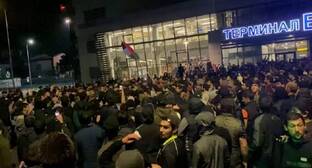26 August 2010, 23:10
HRW: women in Chechnya are instructed how to dress
The federal centre should put an end to the campaign unleashed in Chechnya, where women are forced to observe Islamic instructions of clothes. This was the topic of the statement of the international Human Rights Watch (HRW), which arrived to the office of the "Caucasian Knot".
Human rights defenders note that from the start of the month of Ramadan in mid-August, numerous messages arrive from Chechnya about persecution of women in the streets of Grozny, who appear in public places with uncovered head or in clothes, which are believed to be insufficiently modest.
Let us remind you that the "Caucasian Knot" also wrote about such cases. Thus, in the evening on August 23, in the Zavodskoy District of Grozny unidentified persons kidnapped a young woman. Eyewitnesses say that the reason of kidnapping was her light dress. However, the militia has no information about the incident.
"Compulsion of women to observe requirements of religion or traditions in clothes is interference into their private life, and the Kremlin should stop such attempts. Chechen women, like all other citizens of Russia, should be free in their choice what to wear," Tatiana Lokshina, deputy director of the Moscow HRW office, believes.
The statement of the HRW runs that in the first days of Ramadan a group of men dressed in traditional Islamic clothes (wide trousers and a long chunky shirt), who proclaimed themselves to be representatives of the republic's Muftiyat, began approaching women in central Grozny, publicly shaming them for immodesty and disseminating leaflets with instructions how they should be dressed. It is assumed, in particular, that the head should be covered, the length of the skirt should be much below the knees, and the sleeves should reach the wrist.
Soon these "faith adherents" were supported by aggressive young men, who began grasping women for their sleeves, dress hems, hair and bare arm parts, while uttering obscene and offensive words. In two of such cases, as local human rights activists assert, local power agents took part in such encroachments.




